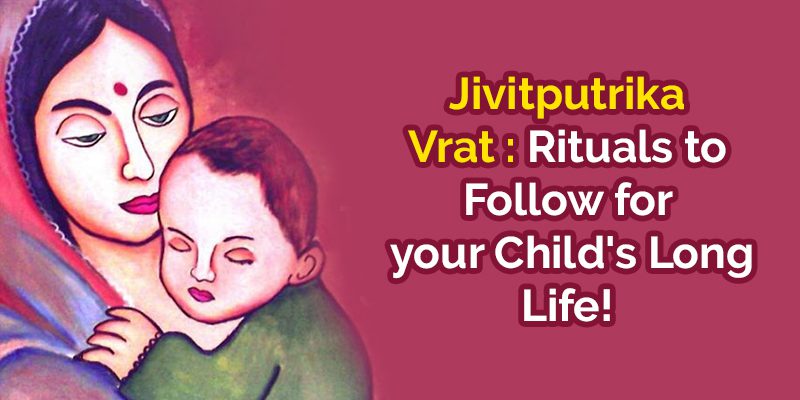Many fasts and festivals are a part of the Hindu religion and culture. Some fasts are observed by wives for the long life of their husbands while some are kept by mothers for the long and happy life of their children. Among all the fasts observed for the long life of children, Jivitputrika fast happens to be a major one and is also referred to as Jiutia fast. This fast is observed without even consuming water.
Connect With World’s Best Astrologers On Call @ AstroSage Varta
Jivitputrika Fast : Tithi and Muhurat
The Ashtami Tithi of Krishna Paksha during the month of Ashwin is usually celebrated as Jivitputrika Vrat. This year, on September 10, 2020 i.e. on Thursday, the fast of Jiutia will be observed. There is an old saying pertaining to this fast that it has its roots in the time of Mahabharata.
Commencement of Ashtami Tithi: September 10, 2020 at 2:05 AM
End of Ashtami Tithi: September 11, 2020 at 3:34 AM
Parna Time of this Fast
The women who keep the Jivitputrika fast will observe the Parna from the sunrise period on Friday morning until September 12 at 12 noon. It is stated that the Parna should be completed before noon.
Personalised AstroSage Brihat Horoscope for your pleasant life!
How did the Tradition of Observing Jivitputrika Vrat Begin?
It is said that Ashwatthama got furious after his father had died during the war of Mahabharata. Out of this rage, he entered the camp of Pandavas and there he saw five people sleeping. Ashwatthama felt that those five people were Pandavas and killed all of them in order to avenge his father’s death.
In reality, those five people were the sons of Draupadi. When Arjun came to know about this, he held Ashwatthama captive and snached away his Divyamani. With this, Ashwatthama became more furious than before and in order to take revenge, he killed the unborn child who was in the womb of Abhimanyu’s wife, Uttara.
Lord Krishna blessed Uttara by resurrecting the dead child in the womb. After the rebirth, the child in the womb was named Jivitputrika. Ever since then, the tradition of observing the Jivitputrika fast came into existence.
Most Accurate Career Counselling For You: CogniAstro Professional Report
Pujan Vidhi of Jivitputrika Fast
On the very first day of Jivitputrika fast, women must take a bath before dawn and then perform the Puja. After this, they eat food and further, remain hungry all throughout the day. On the very next day of this fast, women worship after taking a bath and then, they do not consume water throughout the day. The fast ends on the third day but before this, women offer water to the Sun. On the same day i.e. the third day, Jhor Bhat, Marua Roti and Noni Saag are eaten.
Women perform the worship of Jimut Vahan during Pradosh Kaal on Ashtami. Jimut Vahan is offered Diya, Akshat, flowers and fruits. After the worship, the Vrat Katha of the Jiviputrika fast is recited and heard.
Read the section given below to know about Jimut Vahan
Significance of Jivitputrika Fast
Jivitputrika fast is observed for the long and happy life of one’s children. It is believed whosoever mother observes this fast witnesses the long life and happiness of their children. Those women who listen to the legend/Vrat Katha of this fast, never face a situation of separation with their sons in life. In addition to this, there is always peace in the family because of it.
Are you looking for a successful and pleasant life? Raj Yoga Report has all answers!
Jivitputrika fast Vrat Katha
Jivitputrika fast is observed in Bihar, Madhya Pradesh and parts of Eastern Uttar Pradesh. As per the legend pertaining to this fast, the prince of Gandharva was Jimut Vahan. In the ancient times, Jimut Vahan’s father handed over his kingdom to him while going to Vanaprastha Ashram but Jimut did not feel comfortable after becoming the King. In this situation, he handed over his kingdom to his brothers and went to the jungle to offer his services to his father.
Get Now: List of International Holidays 2020 & Observances 2020
After going to the forest, Jimut got married to a royal girl named Malayavati. One day, Jimut found an old woman with tears in her eyes in the jungle. Upon asking the reason for her tears, the woman replied that she belongs to the dynasty of snakes and has only one son. The serpents have pledged to serve Garuda, the king of birds, with a snake everyday. That day, it was the turn of her son, Shankhchud.
Then, Jimut Vahan told the old woman not to worry about anything and assured her that he would protect her son. Further, he said that he would sacrifice his life for her son. After making a promise to the woman, Jimut took a red cloth from Shankhchud, rolled it and laid down to sacrifice his life before Garuda.
Ask Questions Concerning Your Career!
After this, Garuda appeared and took Jimut, who was covered with red cloth, to the height of mountains. Garuda was highly shocked to see Jimut crying in the beak and asked him who he was. Then, Jimut narrated everything. Garuda was highly inspired by his bravery and courage and promised him not to not take the sacrifices of the serpents further. Since then, the worship of Jimut Vahan began who fought for the protection of sons.
For Astrological Remedies including Gemstones, Yantra, etc., Visit: AstroSage Online Shopping Store
Thankyou for connecting with AstroSage!


Thank you for give each n every small detail of vrat
Good information. .. thank you.